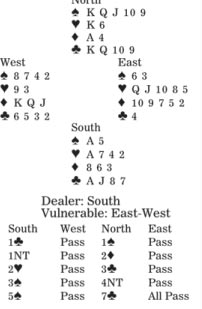
Corrie ten Boom, who wrote a book describing her family's success in hiding Dutch Jews during World War II, said, "When a train goes through a tunnel and it gets dark, you don't throw away the ticket and jump off. You sit still and trust the engineer."
Sometimes understanding the engineer of a bidding convention takes some clear thinking. We are looking at New Minor Forcing. After one of a minor-one of a major-one no-trump, two of the unbid minor by the responder is artificial, promises at least game-invitational values, and asks opener for more information.
In this deal, when South bids two hearts, he indicates a four-card suit and denies three spades. Then, when responder continues with three clubs, it is natural and game-forcing. (With a weak hand and club support, North would have jumped to three clubs over one no-trump-see yesterday's column.) North should realize that if South has only two spades, he must have four or five clubs.
South's three-spade bid shows a doubleton high honor. Then North uses Blackwood before signing off in seven clubs.
Note that in spades or no-trump, there are only 12 winners: five spades, two hearts, one diamond and four clubs. But in clubs, a fifth club trick is available.
South takes the first trick with dummy's diamond ace and draws two rounds of trumps, uncovering the 4-1 break. Then he plays three rounds of hearts, ruffing the last in the dummy, draws trumps, and claims 13 tricks, the same 12 as in spades or no-trump plus the heart ruff.


























 Raymond Zhou:
Raymond Zhou: Pauline D Loh:
Pauline D Loh: Hot Pot
Hot Pot Eco China
Eco China China Dream
China Dream China Face
China Face






